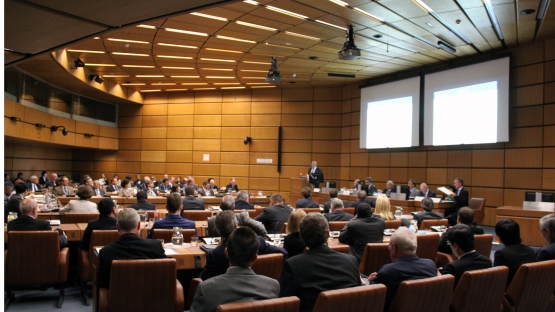The safety of spent fuel and radioactive waste management, decommissioning and remediation are areas of high importance for the IAEA and the European Commission (EC). On these topics, the IAEA and the EC have collaborated for several decades to continually strengthen and improve cooperation and synergies. In 2013, the IAEA and the EC signed a Memorandum of Understanding on Nuclear Safety to reinforce collaboration between the two organizations. The Memorandum outlined an enhanced framework for their continued future activities.
The EC has also taken steps to further the safe and responsible management of spent fuel and radioactive waste generated by nuclear applications, research, education, medical and industrial activities. This included issuing a Directive in 2011 that relates to the safety of spent fuel and radioactive waste management, as well as providing long-term assistance to all European Union (EU) Member States, neighbouring countries and other countries.
These ongoing activities of the EC and the IAEA-EC joint projects were the focus of an event held on 22 September 2014 on the margins of the IAEA 58th Annual General Conference. The meeting aimed to provide an overview of the work of the EC and highlight the existing and future cooperation of the EC and the IAEA.
The meeting focused on three main themes: measures for enhancing and assuring long-term safety of the spent fuel and waste management in the EU; EC support to neighbouring and other countries around the world; EC scientific and technical support in the field of spent fuel and waste management and in decommissioning. The event was concluded by addressing the way forward on the collaboration between the EC and the IAEA.
Following presentations by delegates from the IAEA and the EC, attendees had an opportunity to ask questions and engage in the discussions. The participants, comprising decision-makers, organizations, regulatory authorities, and other interested parties involved in the legal, technical, scientific, environmental and societal aspects related to radioactive waste management, exchanged views on topics such as the optimization of peer reviews and reporting, capacity building in non-nuclear and new nuclear countries, as well as best practices and lessons learned from designing and implementing projects.
A brief presentation was also given on the newly launched IAEA integrated peer review service for radioactive waste and spent fuel management, decommissioning and remediation programmes called ARTEMIS. The ARTEMIS service plays a key role in providing a cross-cutting peer review service for Member States worldwide, as well as in relation to the peer review obligations stemming from the EU Directive on waste management.
Looking to the future, Andrew Orrell, Head of the IAEA Waste and Environmental Safety Section, spoke on behalf of the Deputy Director General (DDG) of the Department of Nuclear Safety and Security, Denis Flory, and outlined three areas for further cooperation between the IAEA and the EC. These included the safe and sustainable management of all types of radioactive waste; strengthening capacities in life cycle safety of uranium production; and addressing demands for assistance with decommissioning of facilities.
"The IAEA and the EC have a long history of collaboration," Mr. Orrell said on DDG Flory's behalf. "And as you see, we have many reasons to continue our joint work."


